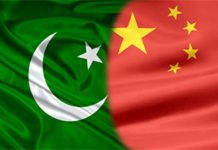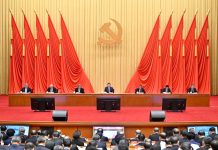
Approximately 80 percent of the participating countries and regions this year are participants in the Belt and Road Initiative (BRI), reflecting China’s continued focus on fostering international cooperation under the initiative.
Agreements for a total of 688 projects were signed during the event, with an expected investment of 488.92 billion yuan ($68.74 billion).
Global collaboration
During this year’s CIFIT, a variety of forums and seminars took place, offering information on the latest investment policies and trends.
The Seventh Belt and Road High-Quality Development Conference, held on September 9, highlighted key areas for cooperation under the BRI, including in green development, digital economy, AI, renewable energy, and financial services.
Hungary, the first European country to join the BRI, has deepened its strategic ties with China, resulting in dynamic economic cooperation. “Chinese investments in sectors including automotive, electronics and logistics have brought advanced technology and management expertise to Hungary, significantly boosting local employment,” Gabor Jenei, Director of the Hungarian Export Promotion Agency, said during the 2024 Gulangyu Forum on September 8.
Sheikh Saud from the Ras Al Khaimah Economic Zone of the United Arab Emirates (UAE), emphasized in an interview with Beijing Review that CIFIT serves as a valuable platform for building relationships, fostering opportunities and promoting collaboration for shared prosperity.
CIFIT also hosted the third Global Alliance of Special Economic Zones Annual Conference, economic and trade cooperation exchanges between Chinese provinces and U.S. states, BRICS digital economy exchanges, and China-UAE economic and trade cooperation exchanges. These activities helped countries expand mutual openness and seize investment opportunities.
Participants from China’s Hong Kong, Macao and Taiwan were also involved in this year’s CIFIT. The 2024 Cross-Straits Young Entrepreneurs Economic and Trade Exchange Event and Cross-Straits Cultural Industry Exchange were among the many events that showcased CIFIT’s role in promoting cross-Straits development. The Hong Kong Trade Development Council hosted the 2024 Fujian-Hong Kong New Energy Innovation event, while the InvestHK encouraged Chinese mainland enterprises to leverage Hong Kong as a global supply chain hub. Macao’s pavilion hosted participants from nine Portuguese-speaking countries, fostering deeper international cooperation.
Steady growth
China continues to attract foreign investment by maintaining a dual focus on attracting high-quality inbound investment and supporting companies in “going global.” This commitment underscores China’s role in building an open global economy and a community with a shared future for humanity.
On September 9, China’s Ministry of Commerce (MOFCOM) released the Report on Foreign Investment in China 2024, which showed that in 2023, China’s actual use of foreign capital reached 1.13 trillion yuan ($163.25 billion), and it added 54,000 new foreign-invested enterprises, a 39.7 percent year-on-year increase. According to the latest World Investment Report published by United Nations Conference on Trade and Development, China accounted for 12.3 percent of global foreign direct investment inflows, ranking second globally and first among developing nations for the 32nd consecutive year.
China’s investment structure has also improved in recent years. Zhao Yang, Deputy Director General of the Department of Foreign Investment Administration of MOFCOM, noted on September 9 at a press conference during CIFIT, “Foreign investment is concentrated on secondary and tertiary industries, which account for 35.2 percent and 64.4 percent of the total foreign investment, respectively. Among them, hi-tech industries attracted $60.98 billion of foreign investment, representing 37.4 percent of the total. Manufacturing industries attracted $45.53 billion, accounting for 27.9 percent of the total, indicating an improvement in the quality of foreign investment.”
Experts also discussed ways to enhance China’s business environment during CIFIT. Yuan Gaoqiang, Vice President of the China Association of Enterprises with Foreign Investment, called for “easing market access, creating fair competition, and facilitating the flow of international elements.”
Wang Zhile, a researcher at the Chinese Academy of International Trade and Economic Cooperation, highlighted the importance of government compliance in “creating a market-driven, law-based and internationally aligned business environment, ensuring mutual benefits for both China and foreign investors.”
Investment is not a zero-sum game. Investing in China does not imply a loss for the investor’s home country. Instead, foreign investment in China has evolved from the traditional offshoring of low-value industries to a strategic pursuit of high-value collaborations in advanced sectors.
According to Xing Ziqiang, chief economist and Managing Director at Morgan Stanley China, “China’s early lead in renewable energy, such as lithium batteries, offers global companies, including traditional European automakers, the chance to establish China as a hub for research and development, improving their global competitiveness.”
“Investing in China is investing in the future,” China’s Vice Minister of Commerce Ling Ji said. As China continues to optimize its business environment, it is expanding opportunities for international cooperation, offering the world access to China’s vast market and growth potential.
On the path of Chinese modernization, CIFIT remains an open platform to the world, fostering collaboration and common prosperity as it writes a new chapter of global growth. –The Daily Mail-Beijing Review news exchange item






